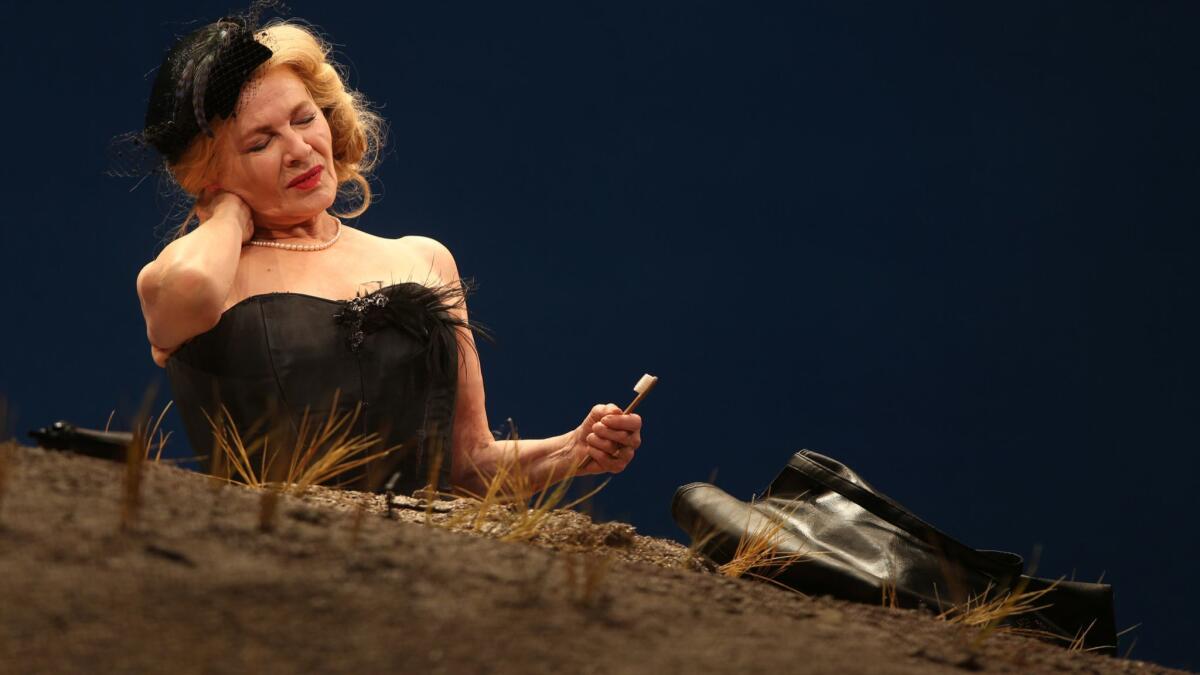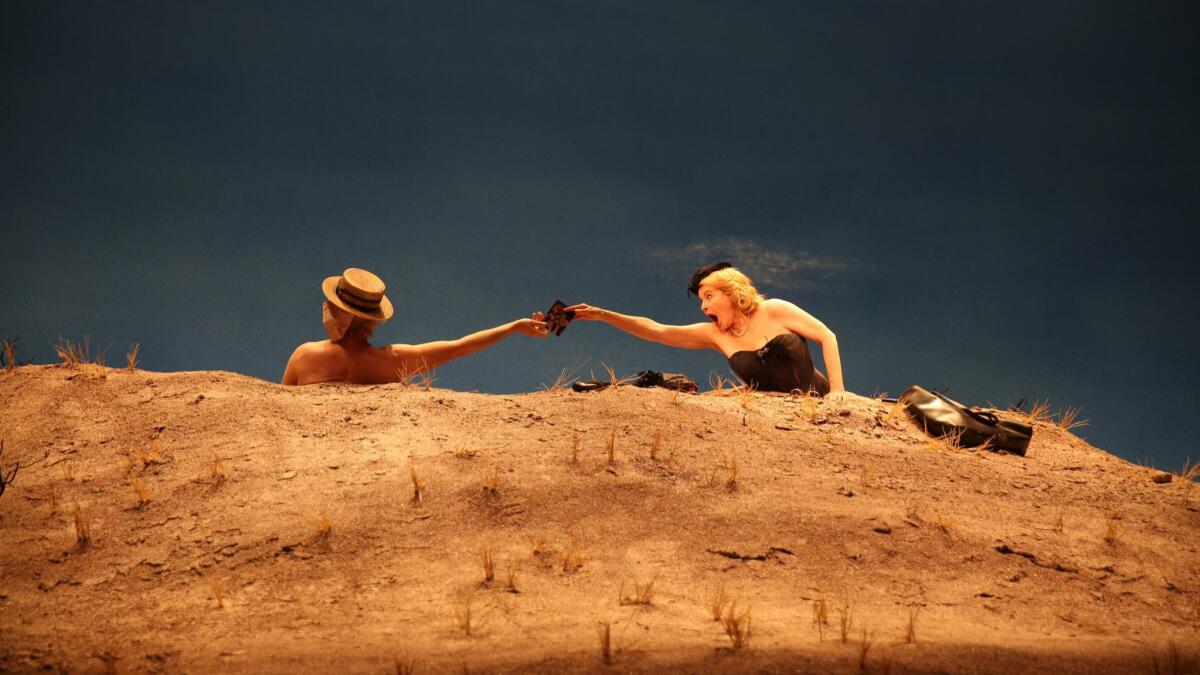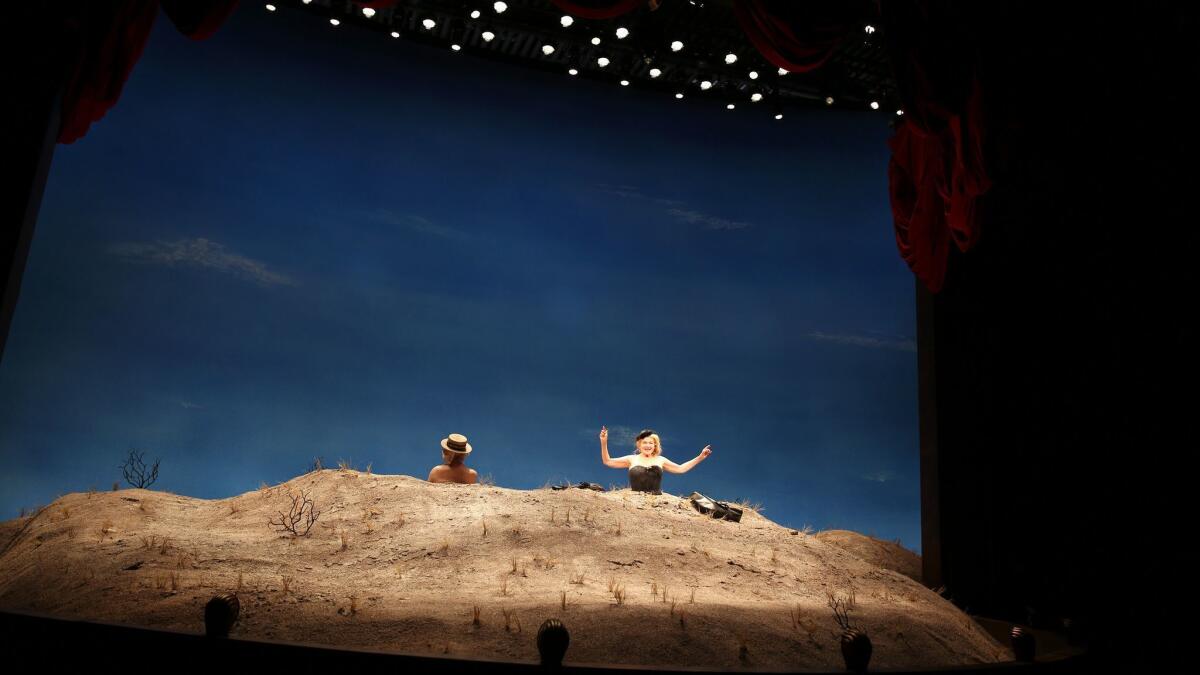Review: Dianne Wiest faces an apocalypse in Beckett’s ‘Happy Days’

- Share via
Samuel Beckett’s “Happy Days” drops its audience into a sun-blasted, desiccated landscape. Foremost in view is a miserable slope of earth, barren but for a few dried-out spines of brush and desolate clumps of brittle, brown grass. A woman is buried up to her waist in that soil, upright but immobilized.
Incongruously, the first words she speaks are: “Another heavenly day.”
Such disconnect might sound like arty affectation, but the opposite is true, for what quickly comes across is wholly recognizable life.
At the Mark Taper Forum, Dianne Wiest ensures that the switcheroo comes off smoothly. She is the riveting center of this 1961 classic of absurdist theater, peeling away its prickly packaging to reveal a lifetime’s worth of understanding: her own and Beckett’s.
You might not glimpse much of the twitchy types that Wiest played in Woody Allen’s films, winning supporting actress Oscars for “Hannah and Her Sisters” and (“Don’t speak!”) “Bullets Over Broadway.” Nor might you see the crisp district attorney of NBC’s “Law & Order” or chipper matriarch of CBS’ “Life in Pieces.” But in this Everywoman role, she contains multitudes.
The half-buried woman, Winnie, seems utterly alone, although after much calling and concerted effort, she rouses a mate, Willie (Michael Rudko), who occupies the other side of the slope, almost out of view. He is mostly silent, rarely responding to Winnie. Yet she talks on and on, afraid to stop. Words keep her attached to the world.

Winnie’s patter is a mix of comforting phrases, idle chatter and half-remembered snippets of poetry. Her thoughts emerge in short bursts. Ever and again, the same topics cycle through.
One might surmise that some apocalypse has occurred. Or that the beyond-middle-aged Winnie and Willie have fallen into the careless disregard of a long marriage. But above all, one senses mortality. The apocalypse here is aging — the waning of life. Winnie senses entombment in a faltering body. She clings to whatever she can, but despite her best efforts, life is burying her.
“So little to say, so little to do,” she says, “and the fear so great.”
This is one of theater’s most difficult roles: an hour and 40 minutes of text spoken by one person, with little input from the other actor — or reference points of any kind. And there’s not just spoken text. Beckett inserted extensive stage directions indicating Winnie’s movements, her pauses, how the lines should be delivered.
Wiest handles it all with poise, precision and empathy.
Her default expression is a pleasant, squinty smile, and she pumps her dry, squeaky voice with uplift. “Can’t be helped,” she chirps. ”Mustn’t complain.”
THE INTERVIEW: Dianne Wiest talks Beckett with Times critic Charles McNulty »
In Beckett’s “Waiting for Godot,” two men anticipate a great event while the rest of life sifts through their fingers. Here, those little events are still to be savored. The alternative, after all, is nothingness.
Winnie occupies herself with the only distractions within reach: the contents of a well-worn carry-all bag. In rare moments of connection with Willie, her youthful flirtatiousness reblooms — a fleeting mercy. Wiest is ever calm and cheerful, but panic surely looms underneath. Out of nowhere, a sigh — or even a sob — sometimes leaps up.
Despair tends to drift back toward hope, though — and even humor. At Wednesday’s opening, the Taper often echoed with laughter. The merest shift of eyes or inflection of voice reveals unexpected layers.
Nuance is a hallmark of this production, directed by James Bundy, dean of the Yale School of Drama and artistic director of Yale Repertory Theatre, where the staging originated in 2016 (subsequently playing in 2017 at Brooklyn’s Theatre for a New Audience).

GRAND AVENUE: The past, present and future explored in a special Times package »
Scenically, though, the production goes big. The Taper stage is remade to look old-fashioned: enveloped in rich wood and outfitted with clamshell footlights and a crimson curtain. Is Izmir Ickbal’s design a nod to the elegant life that Winnie and Willie once knew? Or to our own tendency to drift into the past? Perhaps, but what’s certain is that within this refined environment, the desolation of the couple’s predicament — baked in a white-hot glare by Stephen Strawbridge’s lighting — is like a museum diorama, presented for our edification.
After intermission, the curtain rises to reveal Winnie buried up to her neck. Wiest’s scoured face and blond wig are the same color as the parched earth. She all but disappears into it.
Her calls to Willie get no response at all. Smiles are now few and far between, and a permanent wistfulness has crept into in her voice. Her eyes drift shut. Gravity pulls at her cheeks, her lips. Everything weighs her down, drags her deeper into the dirt.
Should we be forlorn as we watch? Or find comfort? Perhaps Beckett is trying to adjust our expectations so that we don’t sink.
“I can do no more. Say no more,” Winnie utters with what is left of her strength. “But I must say more.”
====
‘Happy Days’
Where: Mark Taper Forum, 135 N. Grand Ave. L.A.
When: 8 p.m. Tuesdays-Fridays, 2:30 and 8 p.m. Saturdays, 1 and 6:30 p.m. Sundays, through June 30 (some exceptions)
Tickets: $32-$115 (subject to change)
Info: (213) 628-2772, centertheatregroup.org
Running time: 2 hours
====
See all of our latest arts news and reviews at latimes.com/arts.
More to Read
The biggest entertainment stories
Get our big stories about Hollywood, film, television, music, arts, culture and more right in your inbox as soon as they publish.
You may occasionally receive promotional content from the Los Angeles Times.











